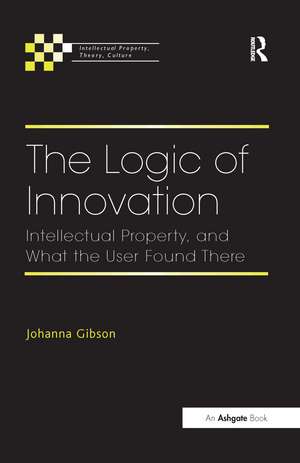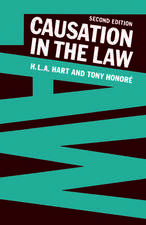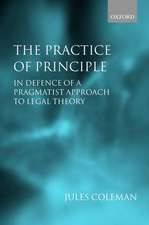The Logic of Innovation: Intellectual Property, and What the User Found There: Intellectual Property, Theory, Culture
Autor Johanna Gibsonen Limba Engleză Paperback – 11 noi 2016
| Toate formatele și edițiile | Preț | Express |
|---|---|---|
| Paperback (1) | 489.26 lei 6-8 săpt. | |
| Taylor & Francis – 11 noi 2016 | 489.26 lei 6-8 săpt. | |
| Hardback (1) | 1122.64 lei 6-8 săpt. | |
| Taylor & Francis – 4 apr 2014 | 1122.64 lei 6-8 săpt. |
Preț: 489.26 lei
Nou
Puncte Express: 734
Preț estimativ în valută:
93.62€ • 98.10$ • 77.39£
93.62€ • 98.10$ • 77.39£
Carte tipărită la comandă
Livrare economică 12-26 aprilie
Preluare comenzi: 021 569.72.76
Specificații
ISBN-13: 9781138255456
ISBN-10: 1138255459
Pagini: 372
Dimensiuni: 156 x 234 x 30 mm
Greutate: 0.45 kg
Ediția:1
Editura: Taylor & Francis
Colecția Routledge
Seria Intellectual Property, Theory, Culture
Locul publicării:Oxford, United Kingdom
ISBN-10: 1138255459
Pagini: 372
Dimensiuni: 156 x 234 x 30 mm
Greutate: 0.45 kg
Ediția:1
Editura: Taylor & Francis
Colecția Routledge
Seria Intellectual Property, Theory, Culture
Locul publicării:Oxford, United Kingdom
Cuprins
Contents: Works of Lewis Carroll; Preamble. Use: Use. Wonder: Part I Of Properties: Cause; Space; Chance. Part II Of Objects: Taste; Risk; Change; Time. Part III Of Games: Rule; Blame; Reason; Account; Witness. Re Use: Re use; After all. Bibliography; Index.
Notă biografică
Johanna Gibson is Herchel Smith Professor of Intellectual Property Law and Director of the Queen Mary Intellectual Property Research Institute (QMIPRI), Queen Mary University of London, where she researches and teaches in intellectual property law. Gibson brings expertise in literature, art history, critical and cultural theory, and law, and consults regularly to industry, the profession, and UK and European government institutions. Gibson is widely published, including the following Ashgate monographs, Intellectual Property, Medicine and Health (2009), Creating Selves: Intellectual Property and the Narration of Culture (2006), Community Resources: Intellectual Property, International Trade and the Protection of Traditional Knowledge (2005), as well as being the editor of Patenting Lives: Life Patents, Culture and Development (2008). Before moving to academia, the author was in commercial practice in intellectual property, media and competition law at the Melbourne, Australia office of a top-tier international law firm.
Recenzii
’Using Alice's travails in Wonderland as her diagnostic tool, in this book Johanna Gibson deconstructs the relationship between intellectual property rights and innovation with all the verve of Lewis Carroll as well as her own remarkable inter-disciplinarity in literature, philosophy and socio-linguistics along, of course, with law.’ Hector L MacQueen, University of Edinburgh, UK ’With Alice as her wide-eyed guide, Professor Gibson embarks on an ambitious trip over language, logic, law, and literature, through a philosophical Wonderland. The work is a tour de force in the form of a journey showing how our preconceptions become curiouser and curiouser when examined in her probing light.’ Sheldon W. Halpern, The Ohio State University and Albany Law School, USA ’This is a towering work of imagination and insight, elegantly written and compellingly argued. If all scholarship was like this our intellectual world would be infinitely enriched. Reading intellectual property law through the looking glass proves an effective device for understanding its maze of rabbit holes, where they lead us and why it matters.’ Fiona Macmillan, Birkbeck, University of London, UK
Descriere
This book examines the efficacy and relevance in a digital environment of intellectual property and the nature of innovation and creativity, by means of an interlocutory through literature and the imagination of new scenarios for language, business and legal reform. Using an original and therapeutic approach the author presents a new theory of familiar production to account for the kinship that has emerged in both informal and commercial modes of innovation, and foregrounds the value of use as crucial to the articulation of intellectual property within contemporary models of production and commercialization in the digital.












